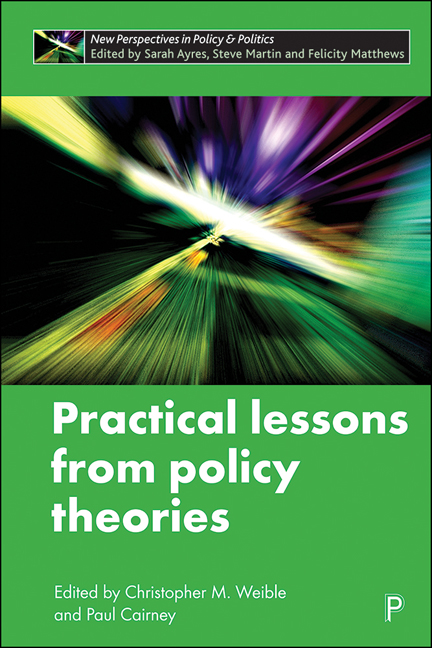Book contents
- Frontmatter
- Contents
- List of figures and tables
- Notes on contributors
- one Purposes and paths in drawing practical lessons from policy theories
- two Three habits of successful policy entrepreneurs
- three Narratives as tools for influencing policy change
- four Using cultural theory to navigate the policy process
- five The lessons of policy learning: types, triggers, hindrances and pathologies
- six Practical prescriptions for governing fragmented governments
- seven Drawing practical lessons from punctuated equilibrium theory
- eight Policy design and the added-value of the institutional analysis development framework
- nine Why advocacy coalitions matter and practical insights about them
- ten Reflections and resolutions in drawing practical lessons from policy theories
- Index
four - Using cultural theory to navigate the policy process
Published online by Cambridge University Press: 05 January 2022
- Frontmatter
- Contents
- List of figures and tables
- Notes on contributors
- one Purposes and paths in drawing practical lessons from policy theories
- two Three habits of successful policy entrepreneurs
- three Narratives as tools for influencing policy change
- four Using cultural theory to navigate the policy process
- five The lessons of policy learning: types, triggers, hindrances and pathologies
- six Practical prescriptions for governing fragmented governments
- seven Drawing practical lessons from punctuated equilibrium theory
- eight Policy design and the added-value of the institutional analysis development framework
- nine Why advocacy coalitions matter and practical insights about them
- ten Reflections and resolutions in drawing practical lessons from policy theories
- Index
Summary
Introduction
Lasswell's (1951) seminal notion of effective policy analysis combines the ‘technical’ tasks of ‘the scientific study of problems’ and ‘policymaking around these problems’ (Turnbull, 2008). Yet uncertainty and complexity are widely acknowledged to structure contemporary policy-making environments (for example, Geyer and Cairney, 2015). Phenomena such as bounded rationality (Simon, 1955) and ‘wicked’ policy problems (Rittel and Webber, 1973) mean that sense-making often relies on more than simply scientific analysis. Grint (2005, 1473) therefore observes that to make progress in confronting often intractable problems, ‘the task is to ask the right questions rather than provide the right answers’. Complexity therefore places a premium on not only evidence and judgement, but also the ability to question, learn and adapt.
In the face of this complexity, institutions matter. Policymakers use institutions to establish and prioritise particular values, norms, rules and roles, thereby reducing the complexity of choice. Sometimes this can be a very positive process, inspiring a flow of ideas and fast-thinking-type solutions to policy problems that ‘fit’ with the policy context. However, sometimes institutions can get in the way – reinforcing values, systems and practices that no longer fit so well, and acting as blinders to emerging issues. So how do policymakers develop effective policymaking strategies when they are so limited by bounded rationality? Do their ‘cognitive frailties’ make them over-reliant on a combination of rational and irrational informational shortcuts to act quickly and make adequate decisions? If so, should institutions be designed to limit their autonomous powers, or instead should their ability to develop such heuristics be celebrated, and work be undertaken with them to refine such techniques? This chapter mobilises Cultural Theory (CT) to address such questions, allowing researchers to examine the role of institutions in structuring how policy actors make sense of their environment.
The central problem addressed by this chapter is thus identified: policy is complex and mediated by institutions, and therefore ‘institutional work’ is needed to enhance the prospects of policy success. However, this raises some further key questions for policy researchers:
• What are the dominant institutional patterns that tend to structure policy problems and guide policymakers’ response?
• How can institutional analysis assist in asking better questions in order to advance policy learning?
• How can research help identify and promote appropriate adaptations in particular policy contexts through the institutional work of ‘creating, maintaining and disrupting institutions’ (Lawrence and Suddaby, 2006)?
- Type
- Chapter
- Information
- Practical Lessons from Policy Theories , pp. 59 - 82Publisher: Bristol University PressPrint publication year: 2021

